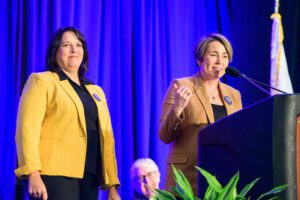Who is a member?
Our members are the local governments of Massachusetts and their elected and appointed leadership.

Gov. Maura Healey (right) and Lt. Gov. Kim Driscoll (left) announced their local aid and road funding proposals for fiscal 2025 and unveiled a new multifaceted package of “resources, tools and flexibilities” called the Municipal Empowerment Act during the MMA Annual Meeting and Trade Show.
Speaking this morning to more than 1,300 local leaders from across Massachusetts, Gov. Maura Healey and Lt. Gov. Kim Driscoll announced their local aid and road funding proposals for fiscal 2025 and unveiled a new multifaceted package of “resources, tools and flexibilities” called the Municipal Empowerment Act.
Healey said the state budget plan she files next week will include a 3% increase for the main discretionary local aid account (known as UGGA), bringing the account to $1.31 billion, and will fully fund the state’s commitment to education aid as called for in the Student Opportunity Act. Notably, her proposed increase in Unrestricted General Government Aid is higher than the consensus forecast of state revenue growth, which is 2%.
Full funding of the fourth year of the six-year Student Opportunity Act schedule would boost Chapter 70 aid to local public schools to $6.86 billion, an increase of $263 million (4%) over fiscal 2024.
On local road funding, the governor said she’ll file a $400 million, two-year Chapter 90 bond bill next week, and her budget bill will include another $100 million in supplemental Chapter 90 funding and $24 million for Rural Road Aid, both funded through the Fair Share Amendment.
Healey and Driscoll both emphasized their commitment to the state’s cities and towns, and to working in partnership.
“We know that everything that we want to do, and we have goals for and a vision for — all of that depends on what you all are doing in your communities, and how well we’re doing working with and supporting all of you,” Healey said. “I want to thank you for your incredible tenacity, your hustle, your compassion and your care for our communities.”
Healey and Driscoll shared the podium to discuss their new package of municipal reforms, the Municipal Empowerment Act, which would allow cities and towns to increase local-option meals and lodging taxes and create a new local-option motor vehicle excise surcharge, reform procurement rules and update borrowing rules for school projects, and make permanent a number of popular pandemic-era allowances for hybrid public meetings, outdoor dining permits, and to-go cocktail sales.
The bill would also establish enforcement mechanisms for prohibitions on doubled-up utility poles, provide new tools for addressing critical local workforce challenges, and centralize the valuation of telecommunications and utility property at the state level. A new OPEB Commission would be established to take a fresh look at opportunities to address unfunded liabilities from non-pension employee benefits.
Driscoll said the package is “a direct result“ of input from local officials during a listening tour she conducted around the state this past fall, when she heard from more than 130 managers and administrators representing 112 different municipalities, as well as professional associations representing local leaders and employees.
“This is a package of really great things,” she said. “It’s designed to arm local government with the resources, tools and the flexibilities you need locally.”
MMA Executive Director Adam Chapdelaine said local leaders “greatly appreciate that the administration made the concerted effort to listen to municipal officials across the state about the challenges they face, and then acted on that input with a robust package of very meaningful reforms.”
“The Municipal Empowerment Act will improve the efficiency and effectiveness of local government and the delivery of essential services in all of our communities,” he said. “For a number of years, municipalities have been facing cost increases in key areas that are far outpacing the growth in their revenues, so the opportunity to boost locally generated revenue and remove barriers to efficiency is welcome news.”
While the Municipal Empowerment Act announcement was met with frequent applause, Driscoll asked local leaders for their help as well.
“It doesn’t happen unless we advocate for it, and we come together to really showcase how meaningful it is, how important it is,” she said. “We’re going to need your help to get it over the goal line.”
Gov. Healey acknowledged that the year ahead will be challenging, with slower growth in state revenues and the drying up of pandemic-era funding from the federal government.
With its new Federal Funds Office, she said the administration is making it a priority to enhance the competitive position of the state and its local governments to win historic federal funding under the Bipartisan Infrastructure Act, the Inflation Reduction Act, and the CHIPS and Science Act.
“In one year alone, through that effort, we’ve brought back $3 billion to Massachusetts,” Healey said.
The close partnership between Healey and Driscoll was evident in their onstage banter, which they likened to comedians Tina Fey and Amy Poehler hosting an awards show.
“Year two is going to get tougher,” Healey said, “but I couldn’t have a better teammate and partner than Kim Driscoll. … Her insight and her knowledge operationally — about how everything works, what you are dealing with — influences and informs policy at every single secretariat every single day.”
Driscoll said of her partner, “You all can see how lucky I am to work alongside somebody who fully understands that we’re not going to achieve our goals in housing and education and public safety and resilience and driving a strong economy unless we have cities and towns that are thriving.”
This story has been amended since it was first published.